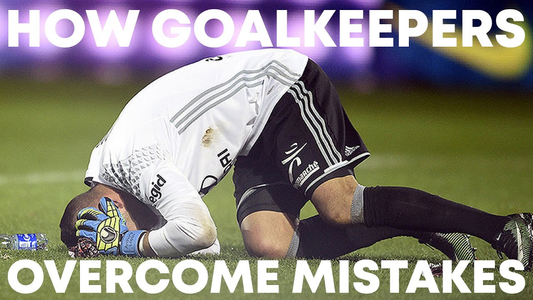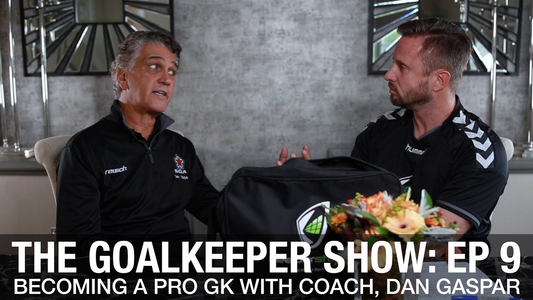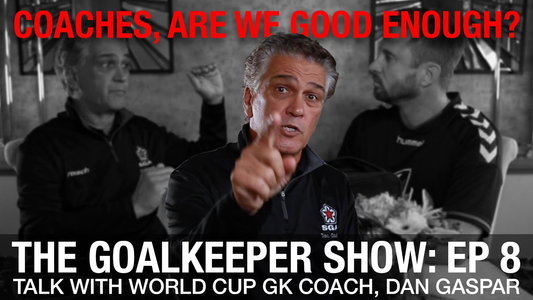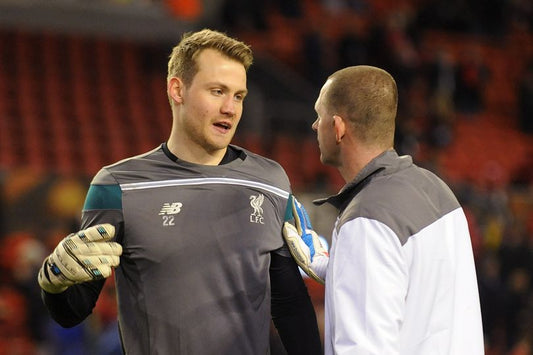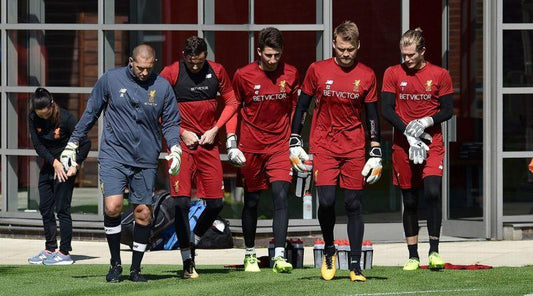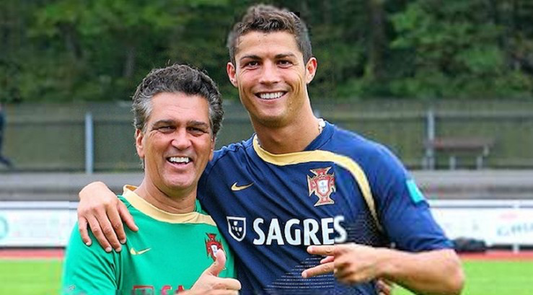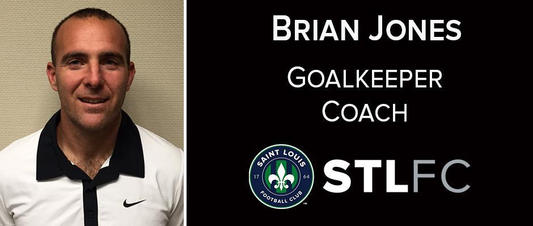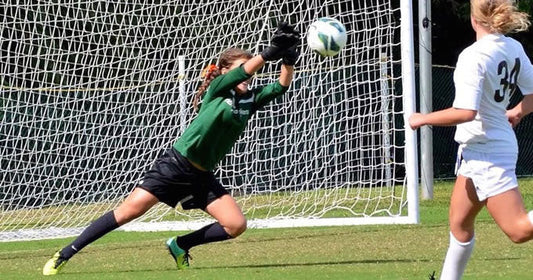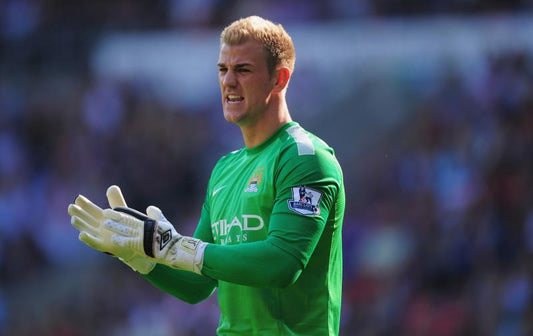As goalkeepers, we are under a lot of stress and expectation from our teammates and coaches. The smallest mistake can lead to a goal and easily ruin your entire game. We have to be able to handle the pressure that comes with our position and use our mind to perform at our best. Psychological training should be a vital part of your training routine to be able to deal with the pressures that come with goalkeeping. Meditation and yoga are becoming more prevelant in soccer, so you should consider adding them to your training routine.
Goalkeeper Psychology
How To Help Goalkeepers Move Past Mistakes During the Games
Goalkeepers, coaches, and parents let's be real... No player is perfect. Youth goalies to professional goalkeepers such as the Alisson Becker and the iconic Gianluigi Buffon have given up goals due to mistakes. If the best goalkeepers let mistakes and errors take them out of the game and off their concentration they would not be professionals. Developing a mistake ritual to overcome blunders and refocus is essential for goalkeepers of all ages to perform better, enjoy more, and grow as player.
What Is Your Mistake Ritual?
Become aware of your reactions when you make a mistake or have negative self talk. How is this reaction serving you? If it is not enhancing your performance it is time to make a change.
Do a physical action. Example: open and close your hand or clap your hands.
Say your mantra to get you back in the present moment. Example: "Release, next play, or here!" Something simple and short to bring you current and expel the negativity.
Mistakes and success come hand in hand. Mistakes can come in all forms such as passing the ball out of the back or a lack of concentration during a catch. Every player makes mistakes. Strikers miss shots, midfielders lose possession in the middle third, and defenders miss-clear a ball. Success is also part of the game of soccer; a great breakaway save that bails your defender out; an upper 90 save that keeps the score 0 - 0 after your striker misses an easy goal; passing the ball well out of the back; even consistent catching and handling. In order to have more success and enjoy goalkeeping more it is important to have a short term memory with mistakes. Don’t let that error eat you up for the rest of the game! Your team needs you. YOU Need You! You can't do anything about the past, so focusing on the present is the only way. Let it roll off you like water on a ducks back. After the game, or a day later, assess what went wrong. Train through the error during the week. Build your confidence. Hard work, focus, and belief will help reduce mistakes.
Train the brain and the body will perform better!
For more questions on athletic performance or sports psychology contact:
Ryan CarrHigh Performance Coachrcarr@bartonhealth.org609-602-4459M.A.Sport Psychology, B.S. Exercise Science
How To Become A Professional Goalkeeper
What It Takes To Become A Professional GoalkeeperInternational Professional Goalkeeper Coach Dan Gaspar
Coach Gaspar has been a part of 4 World Cup qualification campaign with South Africa, Portugal and 2 with the Iranian National team. He was the assistant coach with Benfica, Porto, and Sporting. Dan is a featured clinician with United Soccer Coaches ( NSCAA) and has been a staff coach for the US youth national teams during tournaments and camps. Dan is the founder of Star Goalkeeper Academy as well. There are not many in the world with more passion and experience in professional goalkeeper coaching. This article is an abract of the video of interview conducted with Dan. Enjoy!
Who are a few of the best goalkeepers that coach Gaspar has worked with and why. What made them professionals?Coach Dan has worked with some of the best goalkeepers in the world on 4 continents. He has worked with Tim Howard in his early years. Portuguese legends such as Eduardo, Ricardo, and Vitor Baia. The best goalkeeper in Asia Alireza Beiranvand. He has trained Brad Freidel and Kevin Hartman and the list goes on.Coach Gaspar's Thoughts: They are all so different. I wish I could take an ingredient from one and another and put it together to establish the perfect profile for an outstanding goalkeeper. The uniqueness of each one of them makes them very special. Eduardo was one of the most passionate goalkeepers he has ever trained. Nicknamed by Dan the terminator because of his passion and work ethic. Ricardo because of his field player skills. In the Euros Ricardo saves a PK and than scores one beat England.Iran’s Alireza Beiranvand is a great combination of being athletic and tall at 6’4”+. A big goalkeeper that plays like a mid sized goalkeeper. Beiranvand is one of a few that can say he saves a PK from Cristiano Ronaldo. Brad Freidel is a combination of size and presence. A fierce competitor.
What has made Tim Howard outstanding professional goalkeepers?Coach Gaspar's Thoughts: Tim is much more than a goalkeeper. He had to learn to manage OCD and Tourette syndrome as a youth to play for the biggest clubs on the biggest stage of the world for a long time. Tim was an outstanding athlete. Very similar to Tony Meola, Tim could have gone on to be a pro in other sports. Tim Howard is a man of faith. He has faith as a Christian that helps guide ground him and a belief in himself to motivate.
Philosophies that coach Gaspar instills on youth goalkeepers at SGA to be the best: Coach Gaspar's Thoughts: Dan’s passion is the same for the youth goalkeeper putting on goalkeeper gloves for the first time to the world class professional. The standards of excellence for a youth and professionalism are the same as well. It is important to establish the consistency, composure, the technical foundation and decision making most importantly while maintaining their personality. 98% vs the 2%: 98% look that part and show up physically but to be the best goalkeepers need to show up with their brain. Dan and SGA teach goalkeepers to utilize the strength of the brain. To be a spunge to learn. Bring their heart and soul to every training session. The World Cup mentality every day.
Physical Characteristics: Is it the size of the goalkeeper or more?Coach Gaspar's Thoughts: Every coach wants goalkeepers that are big tall and strong. Today’s modern game has modified the ideal profile of the typical professional. The ideal profile is the goalkeeper with the size, strength, presence of a big goalkeeper with the speed and agility of smaller GK. Goalkeepers like Beto, Jon Busch, Nick Rimando didn’t have the ideal profiles due to their size but had incredible careers. They had to do everything better than everyone else. They had work ethic, passion, intensity, and attention to detail. Their suffering and sacrifice for all of us under 6 foot. Success comes in all sizes and shapes. Don’t give up hope. Success is doing the best you can with the tools you have and excepting the results. That journey of trying to be the best goalkeeper will help a in all aspects of life.
Psychological components that youth goalkeeper must develop for the professional path.Coach Gaspar's Thoughts: Psychological components least addressed and most overlooked. Understand the level of detail. Understand the commitment sacrifice suffering that needs to take place develop and achieve their goals. The importance of balance. The switch and the ability to turn the switch on and off when needed. To turn on the professional training mindset when crossing the line onto the field. To be a fierce competitor and good teammate. The commitment to train in rain snow and to rise earlier than everyone else.Kevin Hartman – Passion, work ethic, determination, and communication.Brad Friedel - Combination of size and presence. A fierce competitor. Performing under pressure over overseas.Victor Baia - was born to be a star, a celebrity but had composure. Had class. His reaction to a mistake or a great save was always very stable. As a result his fans and teammates had a lot of confidence in him.
Psychological initiatives with young professional goalkeepers to believe in their ability. Coach Gaspar's Thoughts: Story about José Moreira – Benfica goalkeeper that made his debut at 19 years old. A lot of pressure on a young goalkeeper playing for one of the top clubs in the world. For the Portuguese Olympic team his teammates and coach believed in him. It took Benfica coach José Antonio Camacho a little more time. Camacho doubted Moreira. Coach Gaspar needed to develop a special partnership with Moreira to encourage and support him through the good times and bad. They made a commitment to each other that they would wear each other skin. That they both would work every moment of every day to convince the coach and players that he was up to the level of Benfica. Coach Gaspar gave Moreira the nickname Gladiator. The conviction that the gladiator needs to have to make a life or death final decision. Moreira needed a coach to believe in him. To help him believe in himself again. He was eager to learn and earn the respect of the coach and players.
Risks of Specialization: How important is it to be a well rounded goalkeeper and person on and off the field? Coach Gaspar's Thoughts: Coach Gaspar feel that coaches must be careful. Specialization at a certain makes sense. Maybe 13? He believes in the wholistic approach. Developing a cultured goalkeeper meaning that are good students, have awareness of the world game, play other sports. We have to be careful of the burn out. The most successful professional goalkeepers that he has trained had well balanced life, family values, positive relationships, hunger and commitment but enjoy life.
Part of Coach Gaspar’s philosophy that will help goalkeepers to become professionals:Coach Gaspar's Thoughts: Hard Core Goalkeeping – Start within and work away from the body. Take care of the ball. The occasional exceptional save is great but coaches prefer their goalkeeper to be simple safe secure. Respect the ball. The ball is extension of their personality. Inside the ball is their hopes, dreams, and aspiration.Love what you do.!
Contact Coach Gaspar at www.stargoalkeeper.com regarding goalie training or summer goalkeeper camps. keeperstop.com loves hearing from the goalkeeper community. Share with us your best saves, moments, as well as learning opportunities. Email or call keeperstop.com with any goalkeeper glove, equipment, or training questions.
The Role of the Goalkeeper Coach - Christian Benjamin and Dan Gaspar
The Role of the Goalkeeper Coach
Where Are We In Goalkeeping Around The World and in the USA?
Coach gaspar has some concerns with the lost of art of catching. We are producing goalkeepers that are blockers deflectors essentially WALLS. He remembers back to the days where he would volley as hard as he could against a wall to work on catching and build confidence. When the ball is in a goalkeepers hands, they are the best players in the world. Better than Ronaldo. Better than Messi. A catch is the ultimate control. We need to get back to one touch goalkeeping or at least get back to controlling the ball. The fear of making a mistake now is so big that we have become blockers with the ball controlling us.
On The Modern Goalkeeper: (3:56 Video) The modern goalkeeper is also a field player. The ability to be comfortable with the ball at the goalkeepers feet and hands is exceptionally important. We don’t want to neglect the hands because of the emphasis of the feet. Combine them both! In order the modern goalkeeper to be a sweeper keeper they need to prevent the ball for going into the back of the net. Lets get back to hard core goalkeeping!
The Role of Social Media in Goalkeeper Training: (5:10 Video) Social media and the internet have an enormous role to play in the lives of goalkeepers…UNFORTUNATELY! The problem being that social media training and unorthodox training methods are now creeping into the outdoor game simply in the pursuit of likes and clicks. We need to be careful on how much influence social media and internet training has on our coaches and goalkeepers. Too much focus is now on playing out with the feet and how good we are with the ball at our feet, but first and foremost we are keepers and we need to be technically proficient at catching the ball. That is our main job. We all need to take on the responsibility of making sure that is our main focus during training – handling proficiency. Do the simple things well – Practice makes permanent. (Check out more articles on catching HERE)
Are US Goalkeeper Coaches Good Enough?: (13:27 Video) Dan has travelled all over the world coaching goalkeepers. He not only thinks US goalkeeper coaches are good enough, they are often times better. European GK coaches methods aren’t necessarily better than their US counter parts. It’s a boils down the countries culture, soccer being the #1 sport in those countries, access to academies and clubs in most major cities and smaller ones too, which allows them to be elevated because of the club brand. US coaches simply don’t have the same access to top teams/clubs and soccer is nowhere near as popular in the US at the professional level. US GK coaches are well educated, have diverse technical and psychological components making them well rounded and informed. US training methods have been well received in many European countries. Dan is an example of just that. He has made a name for himself as a world renowned goalkeeper coach and he was born and raised in Glastonbury, CT.
Goalkeeper Coaching Education: (16:05 Video) The US keeper education is in a little bit of a slump right now. We need to get back to the generations of quality MLS keepers making their way to Europe (Keller, Friedel, Howard) and succeeding. There is no longer 2-3 goalkeepers we can refer to as the true role models of USA goalkeeping right now. It’s disappointing that US Soccer has been unable to confirm a GK Technical Director on both the men’s and women’s side as that role is needed to lay the foundation for GK coaching education. US soccer needs to invest some resources in developing a blueprint/curriculum that all goalkeeper coaches can follow and refer back to.
The importance of humility: (18:50 Video) Video Dan learned a harsh lesson in humility from his Father. Dan’s father was his goalkeeper coach and on one particular day during training, Dan was not at his best and was letting all the shots in. His Dad reset and struck the shots again. Once again, Dan let all the shots in. His father asked him if he was ok to which Dan replied, “You can’t score on me unless I want you to”. That was the last time Dan’s father ever trained him. He packed up his equipment, drove home and let Dan walk. It taught Dan the lesson of humility, listening, learning, growing and understanding. Even though Dan has been coaching for many years he is still eager to learn and ambitious to improve. Dan’s passion and motivation has paved the way for many young goalkeepers to learn from his experience and many have gone on to play professionally and many more have gone on to become professional goalkeeper coaches.
Special thanks to Coach Dan Gaspar of Star Goalkeeper Academy for sharing his wisdom with Keeperstop and Goalkeepers around the world.
Goalkeeper Coach Communication
How Do You Communicate With Your Goalkeepers Before, During, and Post Match?
Communication is important before the game to address and reinforce individual and team goals. Individual goals are specific to the goalkeeper and what they can control such as their ready position or saving technique on cut back pass to the near post as examples. Goalkeepers can address and contribute to team goals such as playing out of the back and defensive organization. Goalkeepers will meet as a unit with Coach Achterberg to discuss scouting reports on the opposing team, identify key players, patterns, special plays or organization on set pieces, etc.
Communication during the game should be positive and constructive! Build the goalkeepers confidence to help minimize performance anxieties and other mistakes. During the game is not the time to be overly critical. Feedback can be given at halftime. Adjustments can be made if it will positively impact the goalkeeper’s performance and team outcome in the second half.
Many goalkeepers from youth to professionals know the mistakes they make. No point being negative or berate a player since it does not build confidence. Sometimes talking about the game immediately following the conclusion is not appropriate. Emotions are raw. Coach John will watch the match, isolate the goalkeeper successes and learning opportunities to help the goalkeeper learn and prepare for the next match.
This was paraphrased from a longer conversation that I had with Coach Achterberg during my time at the 2018 International Goalkeeper Coaches Conference. Many apologies for the noisy Expresso maker in the background. Great goalkeeper coaching insight from John Achterberg.
Motivating the Goalkeeper Training Core
John Achterberg Liverpool FC Goalkeeper Coach, Motivating The Goalkeeper Core.
QUESTION: How do you train and motivate the third and second goalkeepers while maintaining the first choice goalkeeper?
Motivation is not always about hype or cheerleading. It is about belief and encouragement. Coach Achterberg starts with an open line of honest communication with all his goalkeepers. They are given the same information during training. Treated fairly with the same level of respect. Coach Achterberg motivates the goalkeeping core by training hard together. The first choice keeper may work with the starters in 11 v 11 and rotate the 2nd keeper a few days before a match. The next week it may be the 1st and 3rd working together. The day before a match it will be 1 and 2 working with the starters while 3 and 4 get a quality session before training. Whatever the rotation, every goalkeeper needs to feel like they are given the training and support they need. Don’t segregate or favor certain keepers. Coaches you never know when you may need your 3rd and 4th goalkeeper. After all they also carry a heavy training load as well.
Video was taken with coach John Achterberg at the International Goalkeeper Coaching Conference June 2017. Turn up the volume. Listen and learn from a goalkeeper coach that has core of keepers that can be starters.
How To Train and Prepare Goalkeepers
My Thoughts before every training session from youth to national teams:
“Give my personal best attention regardless of their level”
“Try to teach that success is doing the best you can with the tools you have and accepting the results.”
This helps motivate me and inspire my players....
My life and passion is soccer. I have been fortunate to have worked on four different continents. From youth to world class players of all levels and genders. I was blessed to be surrounded by people who had faith, confidence and who gave me the courage to pursue by dreams; people who gave me opportunities to learn and grow and who shared with me their wisdom and knowledge. My tribute to them and the game is to share these experiences and philosophies with others with honor, humility and dignity.
My mission is to provide a process for success for developing soccer players and coaches. My goal is to integrate and respect individual differences and commonalities. My conviction is to foster human growth and development and provide the positive energy to impact their future. We can celebrate the unique aspect of every individual while creating a nourishing environment. My ultimate goal is to unlock the magic and potential of every player and coach I am fortunate to touch.
Give my personal best attention regardless of their level. I believe all players should have the opportunity to realize their dreams and aspirations.
Try to teach that success is doing the best you can with the tools you have and accepting the results. I believe everyday is the World Cup!
My desire for every soccer player is to achieve their maximum potential while having fun and being challenged every step of the way.
I teach with passion, heart and soul with the hopes of players coming alive and falling in love with the game. I try to always deliver a high standard of excellence.
What I have chosen to do as a career is an awesome responsibility. It’s my personal approach that creates the climate and I choose to be a tool of inspiration.
Yours is Soccer,
Dan GasparStar Goalkeeper Academy Founder
How important is winning for goalkeepers?
Player Development vs. Winning
Brian Jones
Goalkeeping Coach, Saint Louis FC
Director, St. Louis Goalkeeping Academy
As a goalkeeping coach/trainer dealing with goalkeepers across the experience spectrum, from 8 year-olds just learning to play the position to National Team goalkeepers of both genders who are at the very pinnacle of their game, it never ceases to amaze me at the lack of understanding between when it’s more important to develop a player and when it is more important to win.
If you have spent more than a weekend or two out on the vast spaces of today’s modern soccer complexes, you probably have experienced a young goalkeeper suffering a goal and the immediate roar of anger, indignation, disbelief and condemnation from the parents and coaches on the sidelines. What I find interesting about this situation is that the vast majority of those contributing their two cents to the situation know very little, if nothing at all, about goalkeeping. Yet they feel the need to berate a young player, more times than not destroying that young player’s confidence. If you look at the way goalkeepers are developed in the rest of the world, the focus from the ages of 8-13 or 14 is strictly on the mastering of the core technical skill sets of the goalkeeper. Young goalkeepers are encouraged to make mistakes while playing, with the idea that the lessons learned while making those mistakes will allow young goalkeepers to continue to move forward in their personal development. Instead of yelling at the goalkeeper, situations are reviewed and studied and recreated in training sessions. Yet, here in our country, we count wins, save percentage, and shutouts as the holy grail of success, regardless of the fact that player won’t even reach high school age for another 5 years. As a goalkeeping coach at the professional level, I have never thought to ask one of our potential goalkeeping signees how many games they won at the U-11 level.
Once a goalkeeper has mastered his core skill sets and developed proper training habits, he is ready to begin the next phase of his progression, which as they move up the competitive ladder, will include winning as an emphasis. Usually, by the age of 15, most goalkeepers who are playing at a relatively high level will begin looking towards potential college or professional opportunities. It is at this stage of a goalkeeper’s career that he must begin to put an emphasis on both winning and regional/national exposure. At this age, players have had the time to mature both emotionally and psychologically, which will help them deal with the pressures that come with needing to win. When burdens of this nature are placed upon players who are not mature enough to handle the demands of expectations, we frequently see some very talented players develop distaste for both the position and the game as a whole. I often wonder how many young goalkeepers in this country have we lost to this lack of understanding, how much talent wasted, how much potential never realized?
As we all know, there is nothing worse than wasted talent. Unfortunately, the sad reality is that until our nation’s soccer culture can mature as a whole, we will continue to lose some of our best and brightest talent before they are even able to drive.
9 Ways for a Parent to Support the Youth Goalkeeper
Parenting, of course, has its challenges. Parenting a Soccer Player adds another level of challenges to negotiate. Parenting a GOALKEEPER – that’s a whole new level or parenting challenges.
While parents of soccer players chat on the sidelines, swap stories on Facebook and connect with other parents in on-line communities such as SoccerParenting.com – when your child is a goalkeeper, it often feels like there is something missing with the conversations. What you deal with, as the parent of a goalkeeper, is markedly different compared to field-player parents.
There is the obvious: ridiculously disgusting smelling goalkeeper gloves, and there is the not-so-obvious: the stress you feel when your child makes a mistake or the unique mental makeup of a child who embraces the pressure of the position and who actually enjoys throwing their body at the feet of an oncoming Striker.
It’s not just having to deal with gross glove and goalkeeper mentalities. Being the parent of a goalkeeper means having to support your child in a much different capacity than a field player parent.
9 Ways for a Parent to Support the Youth Goalkeeper
1. Never call them a Goalie.
I have to put this one top of the list because it’s a cringe-worthy statement that is a clear indication of a parents’ understanding, or lack thereof, of the game and position. In the United States we call the position a Goalkeeper. In some other countries they say Goalie – but not here. It would be like calling a hockey Goaltender a Goalkeeper or the Catcher in baseball the Catchperson. That being said, SO MANY PEOPLE get this wrong, including many coaches. Lead the way here!
2. Find them a Technical Trainer
Some clubs are organized enough to have a full time goalkeeper coach at the club providing regular training for the goalkeepers. If your club is not one of those, or if your child wants additional training, find it! There are some great resources available for finding goalkeeper training, and some well-organized companies with trainers located around the country. Ask around for some recommendations, as not all goalkeeper coaches are alike! And, keep in mind - this is a goalkeeper trainer, not a coach. A trainer generally focuses on more technical training and doesn’t generally watch games and coordinate with the team coach on tactics. If some coordination and cooperation can exist – even better! If you are interested in finding a goalkeeper trainer near you and don’t know where to start – send me an email. I will help.
3. Catch them Being Good
It’s hard to fully understand the fact that your child is going to learn from making mistakes. And, in their position, a mistake often results in a goal being scored. The sting of a goal being scored on them seems like a tough way to learn! Try not to stress as it’s all part of the development process. What will help? To use Tony DiCicco’s popular book title: Catch them Being Good.
Make sure they have a strong memory bank of great saves, stellar communication or spot-on distribution to get them through the tough times and keep them confident. Help them feed this bank by pointing out great things they did in a game. Even if it was a game where they lost or where they made a big mistake – help them to always take away a positive or two.
4. Buy them a jersey!
If your child is just starting out in goal and has been wearing the team away jersey or even a training bib as their goalkeeper jersey – buy them a goalkeeper jersey. One of the cool things about the position, after all, is that you stand out amongst your peers. Wearing a special jersey helps a young player begin to identify as a goalkeeper and gives them confidence. Do you have questions about quality, what is popular and sizing for goalkeeper jerseys? Reach out to a goalkeeper equipment specialist such as www.Keeperstop.com .
5. Keep a positive look on your face.
I remember growing up as a goalkeeper I’d always draw strength from my parents when I took a quick glance to the sideline. If I’d just made a mistake or the game was stressful - I could always count on a reassuring look or a subtle arm pump to help me stay focused and remember that 10 other people were in front of me.
6. Let them be critical.
I’ll say it again, goalkeepers learn from their mistakes. It’s an essential part of a goalkeeper’s development. While there’s a fine line between being too critical and being productive in their evaluation of their mistakes, in order to learn and grow and develop, a goalkeeper needs to analyze their mistakes and learn from them. Allow your goalkeeper to dissect a play that led to a goal or dangerous situation and help them develop the skills and abilities to learn from them so they don’t happen again. As a parent you need to find the perfect balance between listening to them and helping them through providing advice while keeping in mind that they probably know more about the position than you.
7. Protect them in training.
Get them all the gear they need. I always like keepers to come to training with pants and long sleeved jerseys. Even in the heat of the summer, if the session involves repeated diving or breakaways – I require long pants. Do other coaches require that? No, many do not. In fact, in the past 10 or so years we are starting to see more and more goalkeepers come to training in short sleeved jerseys. Of course, they are emulating their favorite professional player who they see on TV. Do you think that professional player wears a short-sleeved jersey in training? Most likely not.
Hard ground, aggressive goalkeeper training and training on turf can be very hard on the goalkeepers’ body and injuries can sideline the goalkeeper temporarily. Utilize a goalkeeping resource such as www.keeperstop.com to learn about protection options such as padded goalkeeper compression shorts to protect your goalkeepers hips (Storelli is my favorite these days); ¾ pants to protect against abrasions and painful bruising during diving or breakaway training; or what goalkeeper glove is best for your keeper.
When I was playing professionally in Italy there is no way I would have been allowed to train without pants and a jersey. In fact, I always wore compression shorts under my pants my coach often encouraged me to wear two jerseys as he spread saw dust down all over the goal area before we trained as a means of softening our movements to the ground. You must protect your greatest asset – your body. If I can barely move around normally without hot yoga a few times a week (and I grew up playing on dirt/grass instead of the harder synthetic turf) as it is – imagine how I would feel if I hadn’t been protecting my body more in my earlier years?
8. Find a goalkeeper camp for them.
I know, kids get lots of training and developmental opportunities and they are expensive. I’m not saying this is a must – but if you are able to afford it – find a goalkeeper specific camp with a great reputation and send them. I do not mean a college camp with goalkeeper training – I mean a goalkeeper specific camp. Personally, I grew up going to No. 1 Camps and then worked many years for SoccerPlus Camps and No. 1 Camps. While they were the original goalkeeper camps in the United States and are still going strong today – there are now more goalkeeper specific camps to choose from. Send them.
After months and months of interacting with field player teammates and maybe a handful of other keepers in a training environment through the club – to stand on a field with 50 or 100 other goalkeepers is a powerful thing. Goalkeepers are a special breed of human being – and when a young goalkeeper suddenly finds themselves amongst so many of them – there is an amazing sense of “THIS is where I belong” that happens.
9. Bring your crossword puzzle.
This was my mother’s coping mechanism. It wasn’t that she wasn’t interested in the game; it wasn’t that she didn’t want to be there – I just took her always working on a crossword puzzle as a normal part of my soccer experience. Now, I realize that sitting and watching a game was just too difficult for her, too stressful. That being said, when I needed that reassuring look – she always had it.
Having a child who is a goalkeeper provides some unique challenges as a parent. Just as our young goalkeepers feel a bit different amongst their teammates, as parents we feel a bit different as well because our stresses and preparation for training and games is different. It’s important we learn how to best support our aspiring goalkeepers, and these 9 reminders are a good first step.
Skye Eddy Bruce is the founder of SoccerParenting.com. A former professional goalkeeper, Skye was a NCAA All-American, named Defensive MVP of the Final Four and was a collegiate and youth club coach. Skye has a passion for ensuring that youth sports provide all families an opportunity to enjoy time together in an empowering and enriching environment. SoccerParenting.com provides parents of elite soccer players with relevant and trustworthy information related to the soccer development of their child. Join SoccerParenting.com today with this coupon code (KEEPERSTOP) and receive a years membership for $15.00 instead of $35.88. You can also find more information on Skye's Twitter and Facebook pages.
Importance of the goalkeeper
You can have an average team with a good goalkeeper and that team is a competitive team. You can have an average goalkeeper on a good team and that team becomes very average. The role of the goalkeeper is key to the success or failure of the team. The goalkeeper is as an important player as a baseball pitcher to baseball, a quarterback to a football team or a big center to a basketball team. However, although the goalkeeper is unique and requires specialized training methods, the goalkeeper is not more important than anyone else on the team. The goalkeeper is a team member and needs to be incorporated in the overall team preparations. The goalkeeper is the eyes of the defense and should be the commander and chief of their defensive line. They should have a gladiator mentality. The Gladiator is extremely focused as they prepare for battle. They have their routine and rituals. How they dress. How they prepare their moves. How they mentally get ready for the battle. When they make decisions its with conviction. No doubts. It’s with everything they have. The goalkeeper’s personality and physical presence can dominate his/her goal area like a gladiator. The goal is their house and the goal area is their ground’s. It is their domain. Anytime they train or play matches they own that real estate. What a deal! No property taxes or maintenance. It’s their play box for free. Unwanted guests should feel the pressure of the goalkeeper through their actions and verbal commands. The goalkeeper can establish the environment within the goal area and beyond. They do their best to prevent conceding goals and initiate the attack. It’s not enough just to make the save. They have to keep possession of the ball with quality distribution for their teammates. Their position allows them to lead their team with verbal and physical communication. Although strategically it’s not the best position to give the armband because of the distance the goalkeeper is from their teammates and the referee as well as the actions that take place further from their goal. But it’s amazing how often the goalkeepers are the captains of the team.
Yours in Goal,
Dan Gaspar
About the Author: Dan Gaspar is the current Iranian National Team goalkeeper coach. Dan is also the founder of Star Goalkeeper Academy and director of Connecticut Soccer School. He was worked with Portuguese powerhouses Porto, Benfica, as well as Portuguese National Team. Coach Gaspar has also coached with the South African National Team and was the head coach of the University of Hartford. Dan has been a pioneer in goalkeeper education for more than 40 years.

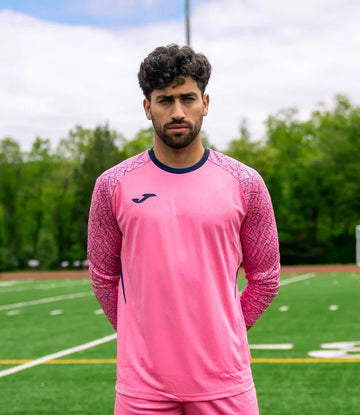
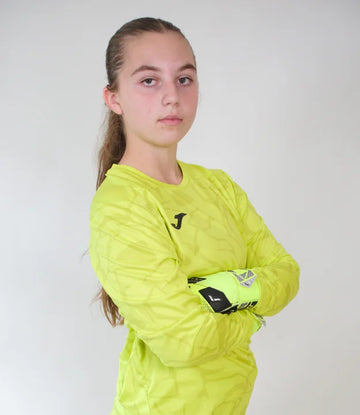
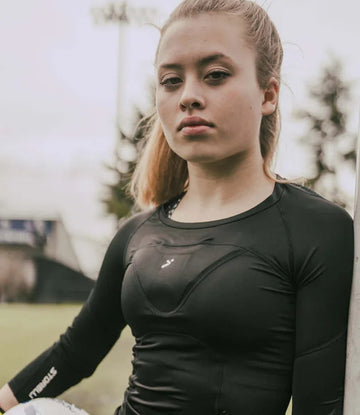
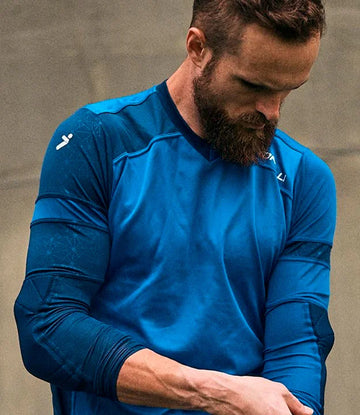
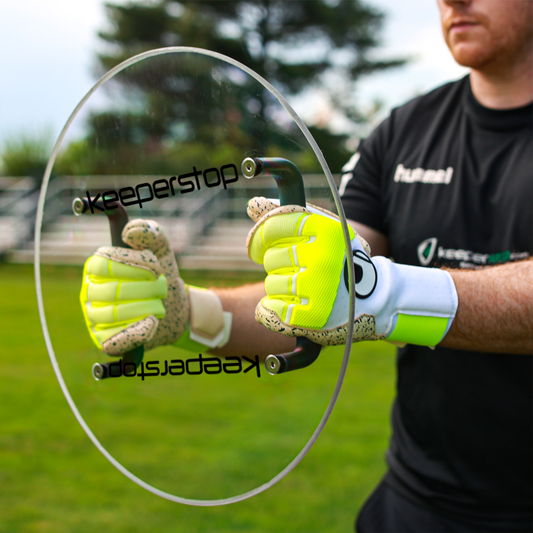
 Gloves
Gloves
 Jerseys
Jerseys
 Gear
Gear
 Brands
Brands
